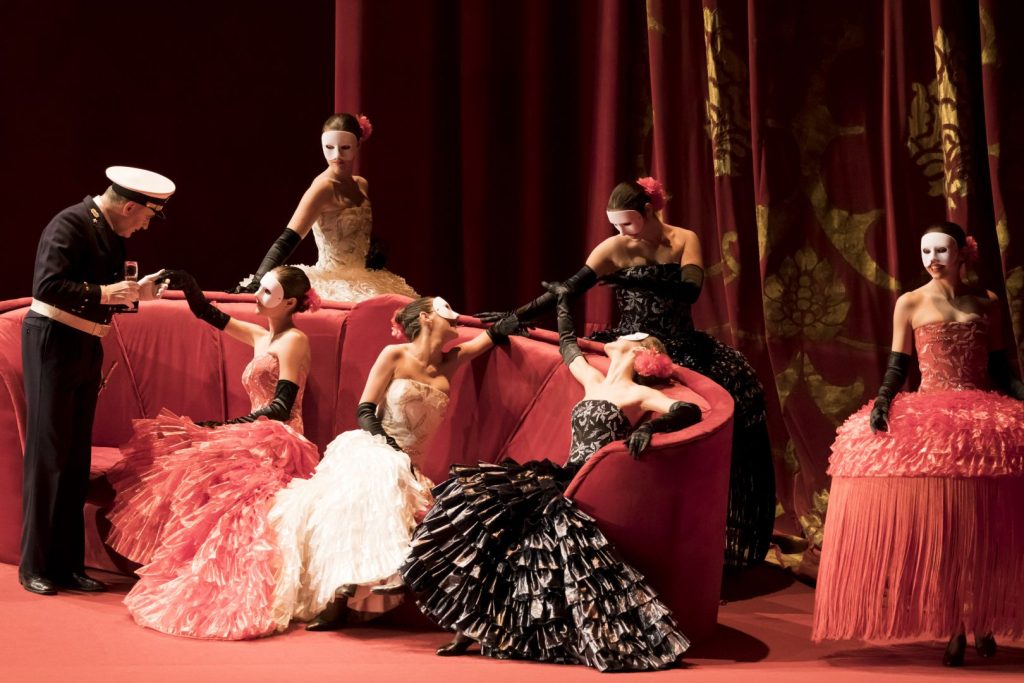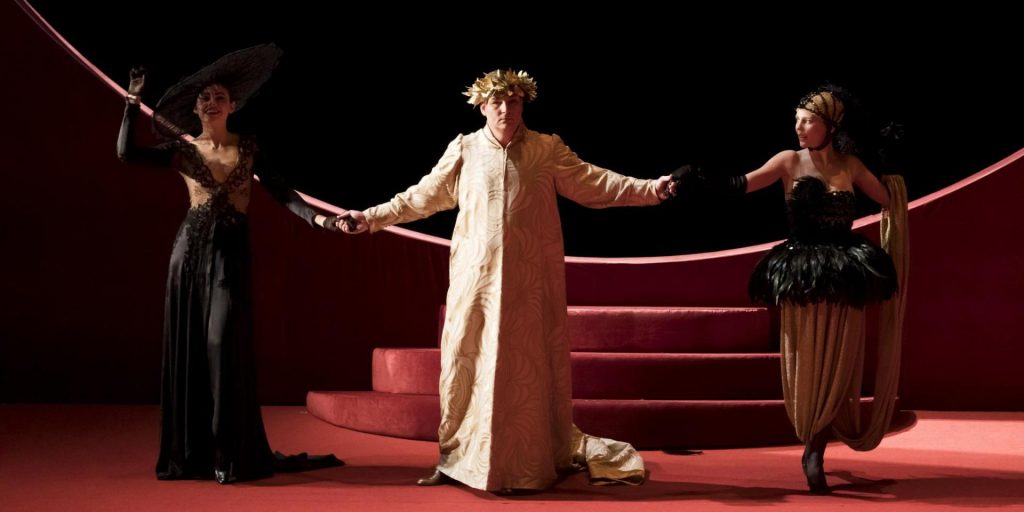
Tragic opera in one act
Composition 1914-1915
Libretto Hans Müller
World Premiere 28 March 1916, Munich Court Theater
(double bill with Korngold’s one act Der Ring des Polykrates )
Publisher Schott
Instrumentation link to Schott Music
Synposis
Source: Liner notes. Violanta. Perf. Munich Radio Orchestra. Cond. Marek Janowski. Sony Masterworks MK 79229, 1980. CD.
Fifteenth cntury Venice.
The scene is the house of Simone Trovai, military commander of the Venetian Republic. It is the night of the great Carnival and the lagoon is bathed in the light of torches and fireworks; revellers can be heard singing the blasphemous Carnival song “From their graves arise the dead to dance…” Matteo,a young soldier, hopelessly in love with Violanta, Simone’s beautiful wife, is mocked by other soldiers and serving-maids. The singing and dancing gains in intensity and reaches fever-pitch as Simone storms in, dispersing the crowds and ordering the soldiers back to their posts. His rage is aggravated by the fact that no-one knows where Violanta is to be found. She has been listless, melancholy and in no sense a wife to Simone ever since her sister Nerina, having been seduced by Alfonso the Prince of Naples, had committed suicide. Since then Violanta has been bent on vengeance.
Giovanni Bracca, a foppishly-dressed artist, enters in high spirits and tries to take Simone off to the Carnival. He is reluctant to go until he hears Alfonso is there. As they are about to leave Violanta appears, her hair in disarray and covered with confetti. She calmly orders Bracca to leave and then explains to her dumbfounded husband how she had gone to the Carnival in search of Alfonso and enticed him away from his admirers by singing the Carnival song. Without revealing her identity she had arranged an assignation at Simone’s house where she intends to have her husband murder Alfonso. Simone is horrified at this plan, not least because Alfonso as Prince of Naples could one day become his commanding officer. But Violanta is maniacally resolved to avenge her dead sister as well as all the other pure women that Alfonso has seduced. She temps her husband with promises of resumption of marital privileges after the murder, and taunts him by hinting that her hatred could easily turn to love were the deed not done. Fired with jealousy and passion Simone concurs, and they agree on a plan. Simone will remain concealed until Alfonso is disarmed; Violanta will sing the Carnival Song so detested by Simone as a signal that he should enter and strike the fatal blow. Simone retires and Violanta is left alone,trembling with anticipation.
Barbara, Violanta’s old nurse, enters; surprised at her mistress’ agitation, she tries to soothe her by singing her an old familiar lullaby. When she departs, leaving Violanta alone in the candlelit room, the scud of oars over the lagoon gradually becomes audible. It is Alfonso drawing nearer. From his boat he sings a serenade to the accompaniment of a lute; when he enters her chamber, he continues to praise Violanta’s great beauty, exhorting her to sing again the song that had brought them together. She insists that he should first take off his cloak and unbuckle his sword. This done, he begins to sing the song himself, but she stops him with an explanation that it will be the last song he will ever hear. At once she reveals her true identity and her intention to avenge Nerina. He interrupts her to explain the course of his life: his lonely childhood with neither mother or sisters, and the hopeless mixture of transitory joys and permanent despair which is his present existence. A longing for the death, he explains is therefore no stranger to him, and he asks her to give the sign and let the deed be done quickly. Violanta, however, is struck dumb; she finds herself unable to utter a word. Alfonso suddenly realises that she indeed loves him and has from the moment she first saw him. Burning with shame, she orders him to leave. Again he bids her give the sign, again she refuses. She bemoans the living death that she must now endure, pure and yet impure, a wife and yet unfaithful, in love with her own sister’s seducer. He implores her to forget the past and the future and to think only the present moment of ecstasy; they fall into each other’s arms and sing of the sublimity of pure love.
Their bliss is interrupted by Simone who, growing impatient, calls out his wife. Violanta recognizes the end of a dream and, spurred on by Alfonso, sings the fateful song with hysterical abandon. Simone rushes in to find the lovers locked in an embrace. Alfonso declares that Violanta has not deceived her husband because she was never really his. In a frenzy, Simone tries to stab him, but Violanta interposes herself and receives a mortal wound.
Bracca rushes in to take Simone off to the Carnival where festivities are in a full swing. Revellers are heard singing the fateful Carnival Song, and Violanta, singing of the purity and sublimity she is to attain, dies in Simone’s arms.
March 2016 was the centenary of the world premiere of Korngold’s first two operas. In Munich on 28 March 1916, Der Ring des Polykrates and Violanta were premiered in a double-bill production. The Museum of Music History in London created a special tribute page as part of their “Image of the Month” series, with archival images and audio recordings from Korngold biographer Brendan Carroll’s private collection.
Link to the page.

